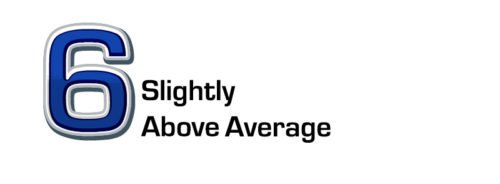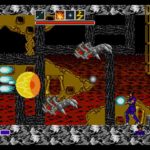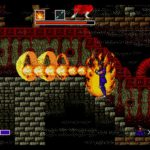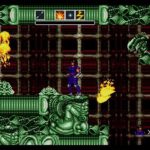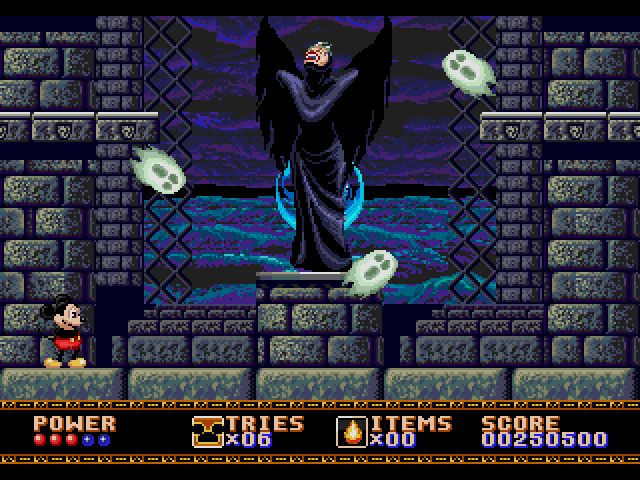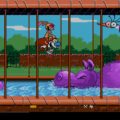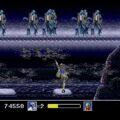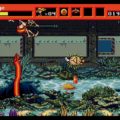Developer: Sega Publisher: Sega Release: 01/90 Genre: Action
The early days of the Genesis were both exciting and a little bit underwhelming. Arcade ports like Ghouls N’ Ghosts and Golden Axe were a clear step above the NES. But then you had titles like Alex Kidd in the Enchanted Castle and Last Battle that, while they looked impressive, were mediocre. Mystic Defender straddles that line, being an early action title with some good ideas. But better titles would eclipse it in its genre. It is a decent game overall but a bottom tier choice against some stiff competition.
The story takes place in an alternate Japan where demons and magic exist. The sorcerer Zareth has kidnapped a woman named Alexandra to use as a sacrifice to resurrect the god Zao. Joe Yamato (god that is generic), sorcerer and exorcist, is dispatched to stop the resurrection.
Mystic Defender was originally an arcade game before its Genesis port. If it seems familiar that is because it is an adaptation of the manga Kujaku Ou. In a strange bit of serendipity I saw the anime Peacock King years later, itself an adaptation of the same manga but never drew the connection. For an even deeper dive Mystic Defender is a sequel to the Master System game Spellcaster. There were a few edits before its release. Joe has been redesigned with a more action focused costume instead of his Buddhist robes. Later versions of the game remove the blatant nudity from the final boss as well. I am surprised it was actually released like that; someone clearly was asleep at the wheel!
Mystic Defender is a side scrolling action game first and foremost but a little different than most. Your attack consists of various spells acquired as you progress. The only difference is they need to be charged first before being unleashed. The fireball is the exception; it can fire smaller, weak shots that aren’t very effective but do help in a pinch. Eventually you’ll gain three more spells; spiritual flame, a ricocheting shot, and a screen clearing dragon. Charging can only be done when stationary but you don’t have to fill the entire meter. The level of charge determines the power, range, and duration a spell lasts. In the case of the flamethrower spell it is particularly devastating at full power. It also adds an element of strategy to the game.
While it sounds like it slows down the pacing it actually gives the game a unique flavor. Mystic Defender is as much a platformer as it is an action game. Nearly all of its eight levels feature an extensive amount of platforming alongside their carefully placed enemies. Some of the later stages even become maze like in their design. It can be a little deceptive however. While they may seem huge the levels are actually pretty short. Due to the stop and go nature of charging magic they simply take longer to traverse. Joe is not the most agile protagonist but he at least controls well, making the game far more tolerable than some of its counterparts.
Mystic Defender features a moderate difficulty curve. Initially enemies are sparse and evenly dealt with. The Spiritual flame spell is powerful and will easily carry you through the game’s first half. Even the boss battles are relatively simple with easily discernible patterns. It picks up significantly in the latter half. At this point enemies become more resilient and the stages labyrinthine. They hide healing items well and they pose a risk to actually obtain. The difficulty curve is smooth the way it should be and I like it.
While Mystic Defender is a solid game it does show its age. It wasn’t an exceptionally pretty title at release although the art direction helped. The stop and go action, while different, also seemed like a step back compared to later NES titles. 1990 saw games like Batman, Castlevania III, and Ninja Gaiden II that were far more exciting. The following years would also see ridiculous action games like Gunstar Heroes and Shinobi III that make this look ancient.
In Closing
Mystic Defender is not a bad game; far from it. But there are plenty of other action games I would recommend before this. There are plenty of early titles for every system that stand the test of time. This simply is not one of them.
